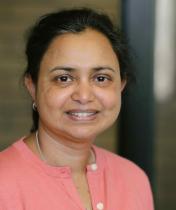Northeast Ohio a significantly high rate of oral disease—including cavities and periodontitis—as well as a low rate of dental appointment attendance among low-income older adults.

Through a new study, Suchitra Nelson, associate dean of clinical and translational research at Case Western Reserve University School of Dental Medicine, hopes to change that. She recently was awarded an initial $656,000 in National Institutes of Health (NIH)-National Institute of Dental and Craniofacial Research (NIDCR) funding for a two-year pilot project to test interventions that could reduce these disparities.
If the project is successful, it is expected to transition to a five-year, large-scale clinical trial with a proposed budget of about $6.4 million.
Through the project, titled “Multi-Level Interventions to Reduce Oral Health Disparities Among Adults in Primary Care Settings,” Nelson and collaborators David Kaelber, professor of medicine, pediatrics, and population and quantitative health sciences at Case Western Reserve University and vice president of health informatics in the MetroHealth System, and Gregory Heintschel, chair of the department of dental medicine at MetroHealth and senior associate dean with CWRU School of Dental Medicine, aim to work with primary care physicians and nurse practitioners to help them identify oral health issues and educate their patients about the connection between oral and systemic health.
Medical staff will also be involved and use the Epic electronic health record (EHR) to ask, assess and refer, if necessary, to the MetroHealth dental team or outside dental clinics for care.
“Factors leading to these disparities are the lack of incorporation of oral health into EHRs and inadequate oral health education and training for medical providers. There are also misperceptions about oral diseases among older adults which prevents regular dental attendance,” Nelson explained.
Nelson and her team will focus on ensuring physicians and nurse practitioners—specifically those caring for adults ages 55 and older—are trained in oral health education and care. Along with MetroHealth, they will train providers at 10 different practices, she said.
“MetroHealth is incredibly pleased to be collaborating as co-investigators with the School of Dental Medicine on this study,” said Kaelber and Heintschel. “The collaboration provides a rare opportunity to be able to more closely integrate oral and systemic health to the benefit of the senior population. This particular grant is innovative and unique in that it recognizes the value of this kind of partnership.”
Using a multilevel intervention approach, the project will intervene on the provider and system levels, the latter of which will target the EHR.
“We are really excited about the oral and medical integration of the project,” said Nelson. “This is believed to be the first clinical trial to try to incorporate oral health into primary care.”
Nelson explained that the team would be changing the EHR system and adding five questions about patients’ oral history during medical appointment vitals checks:
- Do you go to the dentist?
- Do you have bleeding gums?
- Do you have pain in your teeth?
- Do you experience dry mouth?
- Do you have loose and/or discolored teeth?
“We hope this will be a standard of care in the future,” explained Nelson. “Our goal is that primary care providers will check the condition of the oral cavity together with the other body systems to improve overall health and help the patients get timely dental care.”

